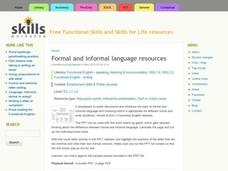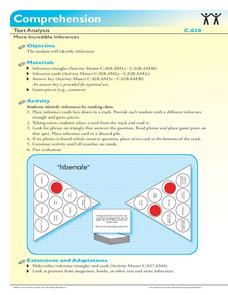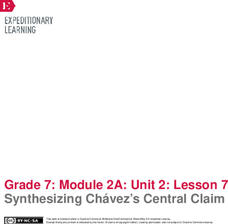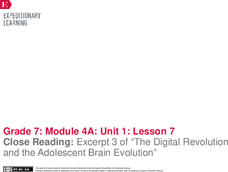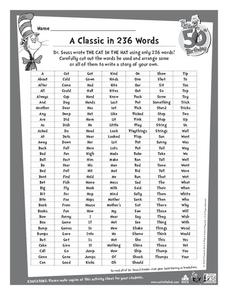Newspaper Association of America
Game On: Constitution Activities for Elementary through High School
Who would've guessed that a document written over 200 years ago would still have a lot to teach us today? A set of folder games incorporates parts of a newspaper to teach about the Constitution and how it still applies to life today. The...
Lakeshorelearning
Read and Write about It
Reading informational text is a skill that transcends subjects and grade levels. Practice reading about different topics in various formats with a language arts lesson that includes opportunities for writing and research as well.
The New York Times
Collateral Damage? Researching a Connection Between Video Games and Violence
Hook your class into an exploration of and discussion about violence in video games with a cute animal clip and a video game trailer. After a quick discussion about how media can affect mood, class members read a related article and...
Curated OER
Formal and Informal Language Resources
Yo! Check it out. Here's a lesson on formal and informal language. And the packet includes a game. What fun!
Florida Center for Reading Research
Comprehension: Text Analysis, More Incredible Inferences
Reinforce inference skills with a learning game! Scholars read scenarios on cards and match them to a written inference on the triangle. The first pupil to match all their inferences wins!
EngageNY
Paraphrasing and Evaluating Sources: “Gaming Can Make a Better World”
Explore how gaming might make the world a better place. To dissect the statement, scholars watch video clips about the benefits of video games. While listening, pupils make notes in their researcher's notebooks, attempting to discern the...
University of Kansas
Newspaper in the Classroom
Newspapers aren't only for reading—they're for learning skills, too! A journalism unit provides three lessons each for primary, intermediate, and secondary grades. Lessons include objectives, materials, vocabulary, and procedure, and...
EngageNY
Understanding Douglass’s Words: An Escape Attempt
Make a match! Scholars play a matching game after looking at excerpt five from Narrative of the Life of Frederick
Douglass. Learners match types of figurative language with example sentences, and add to their powerful language word wall...
EngageNY
Finding Relevant Information and Asking Research Questions: The Benefits of Video Games
Video games may not be so bad after all. As scholars read the text "The Many Benefits, for Kids, of Playing Video Games," they summarize the gist in their researchers' notebooks. Next, pupils draft supporting research questions based on...
EngageNY
Contrasting Evidence: “Games Can Make a Better World” and “Video Games Benefit Children, Study Finds”
Anecdotes, analogies, testimonies, statistics. The most powerful arguments rely on multiple types of evidence. Scholars explore the topic as they read contrasting evidence about the benefits of video games. They complete Venn diagrams to...
Gourmet Curriculum Press
Author's Purpose
Who knew determining author's purpose could be turned into a game? Four teams compete to correctly identify the author's purpose for writing a series of passages.
K12 Reader
What Do You See? (Inferences)
Making inferences is a skill that goes beyond the comprehension of written text. In this simple exercise, young learners are provided with a photograph and asked to answer a series of inference questions using only on the information...
E Reading Worksheets
Fact and Opinion - Worksheet: 1
Pupils identify fact and opinion statements with a language arts worksheet. Then, they explain their thinking in a sentence, including the clues or set of words that helped them arrive at their answer.
EngageNY
Synthesizing Chávez’s Central Claim
Class members play an interactive game, matching strips of paper containing rhetorical devices with examples from César Chávez use rhetoric in his 1984 speech, "Address to the Commonwealth Club of California." Next, partners discuss...
EngageNY
Close Reading: Excerpt 3 of “The Digital Revolution and the Adolescent Brain Evolution”
It's time to level up and discover how video games affect the brain. Pupils explore the topic as they continue reading excerpts from an article about adolescent brain development and the digital revolution. Scholars also participate in a...
Curated OER
Triangular Trade
This lesson plan has it all, primary source documents, an interactive trade game, clear teacher background information, and sailing to the West Indies chance cards. You will play, trade, and live out the experiences of early colonists in...
K12 Reader
What Happens Next?
While your students may not be psychics, that doesn't mean they can't predict what will happen next in a story. To hone this important reading comprehension skill, young learners read a series of three short passages before writing a...
The New York Times
Dark Materials: Reflecting on Dystopian Themes in Young Adult Literature
The Hunger Games. Maximum Ride. Why is so much of young adult literature so dark? What is the appeal of dystopian literature to young readers? The six activities in this resource ask kids to reflect on some of the reasons this genre has...
American University
Factitious
Truth or factitious? Users of an engaging interactive test their ability to identify whether an article is real or fake news.
EngageNY
Identifying Main Ideas and Supporting Details: What’s Going On in the Teenage Brain?
What's going on in the teen brain? Pupils consider the question as they continue reading an informational article about the topic. While reading, they use a Thinking Log worksheet and an anchor chart to track their understanding of...
Jackson Public Schools
Summer Reading Activities
Provide parents with the tools they need to bridge the summer learning gap with this collection of fun activities. Whether it's creating an alphabet poster with illustrations for each letter, playing a game of sight word concentration,...
Student Handouts
Learning Cubes
Add a game-like aspect to class discussion or writing with a die that has something other than numbers on it. You or your learners can roll the die to decide if it's time analyze, compare and contrast, describe, explain and illustrate,...
Seussville
A Classic in 236 Words
Get in the reading spirit on Read Across America Day while celebrating Dr. Seuss' birthday with four printable worksheet activities. Included is a word search using story character's names, a quiz to test how many Dr. Seuss titles you've...
EngageNY
Close Reading Excerpt 2: Plantation Life
Time for a good old fashioned match game! Readers complete an initial, second, and third read of Plantation Life to gain a deep understanding. After close reading the text, scholars practice identifying paraphrasing by matching sentences...
Other popular searches
- English Language Arts Games
- Word Games Language Arts
- Language Arts Games Clauses
- Language Arts Games 8
- Fun Language Arts Games
- Language Arts Games 8th
- Phonic Language Arts Games
- Language Arts Games Modals
- Games for Language Arts





